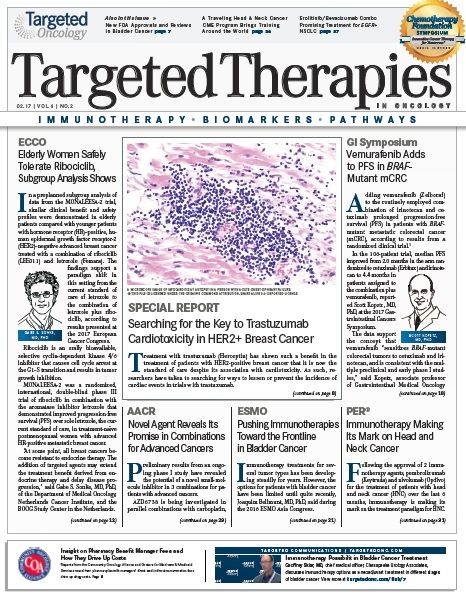Anti-BCMA CAR T-Cell Therapy Approaches 80% Response Rate in Multiple Myeloma
An investigational anti–B-cell maturation antigen chimeric antigen receptor T-cell therapy demonstrated an objective response rate of 78% in patients with relapsed/refractory multiple myeloma.
Yi Lin, MD, PhD
An investigational antiB-cell maturation antigen (BCMA) chimeric antigen receptor (CAR) T-cell therapy demonstrated an objective response rate (ORR) of 78% in patients with relapsed/refractory multiple myeloma, according to interim findings of a phase I dose-escalation study. Results of the first-in-human, open-label, multicenter trial (NCT02658929) were presented during the 2016 EORTC-NCI-AACR Symposium on Molecular Targets and Cancer Therapeutics, which was held November 29 to December 2 in Munich, Germany.
“bb2121 has demonstrated exciting clinical response in heavily pretreated myeloma patients including stringent complete response and minimal residual disease (MRD)-negative disease,” said investigator Yi Lin, MD, PhD. “In addition to the exciting clinical response, we also have not seen any severe toxicities to date, making this a very promising treatment regimen in myeloma.”
The ongoing phase I CRB-401 study enrolled heavily pretreated patients with multiple myeloma who had received a median of 6 prior therapies, all of whom underwent autologous stem cell transplant and had prior exposure to a proteasome inhibitor and an immunomodulatory agent. Sixty-four percent of the patients had been previously treated with daratumumab (Darzalex), 100% with lenalidomide (Revlimid), 82% with pomalidomide (Pomalyst), 100% with bortezomib (Velcade), and 82% received carfilzomib (Kyprolis). The median age of patients was 58 years, and 64% were male. At enrollment, about half of the patients had poor prognostic features, including high International Staging System stage and/ or high-risk cytogenetic changes.
Patients underwent leukapheresis and their mononuclear cells were shipped to a central facility for manufacturing. They also received a lymphodepletion conditioning chemotherapy regimen that consisted of cyclophosphamide and udarabine for 3 days and 2 days of rest before the CAR T-cell infusion.
Lin, assistant professor of medicine and oncology at Mayo Clinic, noted that this was the first multicenter myeloma CAR T-cell study with central manufacturing, “thus testing, in addition, the feasibility of making CAR T cells available to more patients.”
The bb2121 treatment consists of autologous T cells that are transduced with a lentiviral vector that encodes a novel CAR in- corporating an anti-BCMA single-chain variable fragment, a 4-1BB costimulatory motif, and a CD3-zeta T-cell activation domain.
Eleven patients were enrolled in the study and dosed in 5 dose cohorts: 5.0 x 107 (cohort 1), 15.0 x 107 (cohort 2), 45.0 x 107 (cohort 3), 80 x 107 (cohort 4), and 120 x 107 CAR-positive T cells (cohort 5). All patients were evaluable for safety. The first 9 patients, in the 5.0 x 107, 15.0 x 107, and 45.0 x 107 dose cohorts, underwent their first multiple myeloma tumor restaging and were evaluable for efficacy.
The primary endpoint of the trial is incidence of adverse events (AEs) and abnormal laboratory test results, which include dose-limiting toxicities (DLTs). Secondary endpoints include complete response (CR), very good partial response (VGPR), and partial response (PR). Researchers involved in the study are also hoping to determine the recommended dose for additional clinical trials.
As of the data cutoff date, November 18, 2016, the ORR was 33% in cohort 1 and 100% in cohorts 2 and 3. In cohort 1, 1 patient had progressive disease, 1 had stable disease, and 1 had a PR. In cohort 2, 2 patients had stringent CRs; the time to response was 2 months in 1 patient and 4 months in the other. One patient also experienced a VGPR and 2 patients were reported to have MRD negativity after 1 month. In cohort 3, 3 PRs were observed.
After 2 weeks or beyond, all patients enrolled in cohorts 2 and 3 who had bone marrow involvement at baseline had no detectable multiple myeloma cells in their bone marrow.
Regarding safety, no DLTs were observed. Additionally, there were no grade 3 or higher reports of neurotoxicity or cytokine release syndrome (CRS), and no patients were given tocilizumab or steroids to manage AEs. Grade 1/2 CRS was observed in 73% of patients, with the symptoms mostly being grade 1. The most common treatment-emergent AEs were neutropenia (89%), leukopenia (67%), and anemia (44%).
“We are pleased that these early data from our ongoing phase I study of bb2121 demonstrate objective antitumor responses in heavily pretreated patients with multiple myeloma,” David David- son, MD, chief medical of cer of Bluebird Bio, the company devel- oping bb2121 in collaboration with Celgene, said in a statement. “We are also encouraged by the safety profile to date, particularly the lack of severe cytokine release syndrome or neurotoxicity. In light of these positive data, and thanks to the multiple participating clinical sites and centralized manufacturing infrastructure we and our partner, Celgene, have built for this program, we anticipate efficiently completing the dose-escalation stage of the trial and initiating the expansion cohort.”
The ongoing CRB-401 trial is currently enrolling patients at 7 sites within the United States, with an anticipated total enrollment of 50 patients.
Reference:
Berdeja J, Lin Y, Raje N, et al. Clinical responses with bb2121, a novel anti-BCMA CAR T cell therapy: initial results from a phase 1 multi-center trial in relapsed/refractory multiple myeloma. Presented at: 2016 EORTC-NCI-AACR Symposium on Molecular Targets and Cancer Therapeutics; November 29-December 2, 2016; Munich, Germany. Abstract 14LBA.

Survivorship Care Promotes Evidence-Based Approaches for Quality of Life and Beyond
March 21st 2025Frank J. Penedo, PhD, explains the challenges of survivorship care for patients with cancer and how he implements programs to support patients’ emotional, physical, and practical needs.
Read More